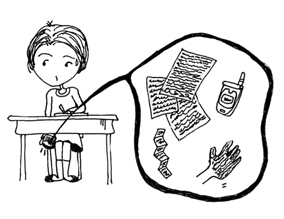Sub head: Act of Dishonesty Unveiled, Measures to be Taken

In the midst of arising awareness of the severity of acts of dishonesty in universities, Ewha has not escaped notice. There was recently an incident where a sophomore of the College of Pharmacy posted a memo on the bulletin board of the Internet site "Ewhaian, saying that she had not received payment from a senior of the College of Music for substituting in her class. The senior has been expelled from school and the sophomore suspended of attendance for an indefinite period.
"Such a blatantly dishonest incident is unprecedented here, says Kim Young-shim, the manager of the Office of Student Affairs. However, students claim that such problems have always existed. "Then I knew it had taken place at my own school, I was quite ashamed, but not so surprised. Although not as serious as this one, minor acts of dishonesty have always been prevalent," says Joo Hyun-ji (Social Sciences, 2).
As a response to such a trend and the problems caused by it, major universities have already started seeking for solutions. Korea University is in its last stage of activating a data plagiarism system that automatically searches and spots any clauses in students assignments that have been copied right out of Internet sources. "It is our attempt to prevent our students from even considering taking credit for other people's work," says Kim Chang-bae, the manager of the Office of Academic Affairs of Korea University. This system is to be partly activated during the first semester, and fully utilized by the end of the year. Yonsei University used supervising cameras during its final exam week last year to prevent cheating during the exam. They filmed the students from various angles in the examination room.
In webpages of renowned universities in United States such as Cornell and Stanford, there is a section that informs students of the integrity issues at a place that is easily accessible by students. Thus, students become well aware of the consequences of acts of dishonesty, thus naturally form a negative concept of such actions.
The incident at Ewha has highlighted the need for additional measures to deal with cheating. There already are certain internal regulations based on the school law, concerning acts of dishonesty. Internal Law number eight, which concerns the disciplinary punishment of students, defines the acts viable for punishment: acts that interrupt the academic activities within the campus, acts that go against the basic obligations of duties of students, and various acts of cheating. According to Internal Law number nine, acts of cheating can lead to censure, disciplinary confinement, suspension, or expulsion. The intensity of a punishment is to be decided by the professor or the college concerned, according to the weight of the dishonest behavior.
Now, the school is coming up with more than just a set of laws to actually prevent acts of dishonesty. "We are planning on intensifying the supervision during exams and classes," says Park Sook-young of the Office of Academic Affairs. To do so, there is a hidden card coming up.
In order to prevent substitution on exams, an electronic attendance system will be installed that requires students to log on into the exam room with their own student ID card. It is scheduled to be put into practice during the first semester of 2005.
Substituting for chapel, which also has been one of the most prevalent acts of dishonesty, is now to be put on a strict supervision. The ones that are caught will not only fail chapel, but also will be punished accordingly.
"We are in the process of examining the policies of other domestic and foreign universities as we develop our own standard for regulating integrity issues," says Park. She continues, "The root of the problem lies in the mindsets of the students. We hope to see a new trend emerge among students regarding ethical behavior in their academic environment. We hope that all our students will soon routinely view acts of dishonesty as completely unacceptable."
Ewha Voice
evoice@ewha.ac.kr

